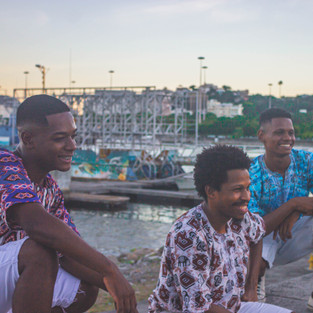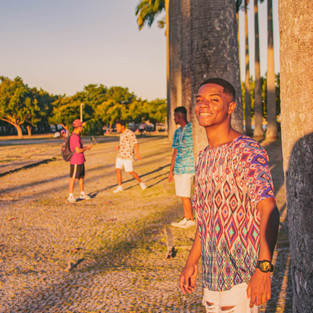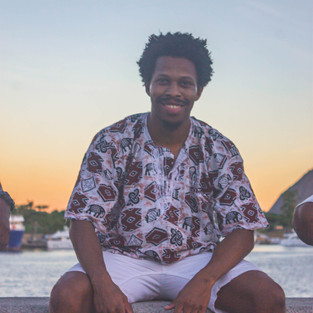Connecting The African Diaspora Through Samba
- AfroConex

- Apr 23, 2021
- 7 min read
Updated: Mar 7, 2023
In our second collaboration with Mayombe (@Mayombemasai) he teamed up with fellow sambistas Patrique Mattos (@patriquemattos) and Filippe Dos Santos (@Fillsan_) to bring the energy of samba and carnival to a Caribbean soca beat. The video is a great example of the role music and dance plays in connecting diverse yet similar Afro Cultures. The pulsating beat of the Kes' "Itzwe" is addicting and invigorating.
We caught up with Mayombe to further our conversation on the preservation of Afro Brazilian Samba and the connection between urban dances and cultural dances.
1.
AFROCONEX: Mayombe this is our 2nd collaboration with you. Our first collaboration, (see video at end of post) which captured you dancing samba to an Angolan Afrohouse beat went viral. I really loved that video and rewatched it often because you move so effortlessly. How did you feel when pages like @Ilovethisdanceofficial reposted the video?
MAYOMBE: I believe that for any artist, seeing their work recognized is always very good. This feeling has already happened when AfroConex invested in my work in some way, which here in Brazil is very difficult to happen. The recognition of students all over the world and other professionals always brings a good feeling, but I always admired other dances like house, hip hop and I identify a lot with them. I even thought about participating in I LOVE THIS DANCE dancing samba, and when I saw them sharing I went crazy. Having the audience for these dances that I admire watching and enjoying my art and culture was a dream come true.
2.
AFROCONEX: One of the objective for the video was to draw a connection between what is considered “cultural” dance (like Samba) and what is considered “urban dance” We wanted to show that both can inspire each other. Do you agree that cultural dance can inspire urban dance and vice versa?
MAYOMBE: I believe that in some way, urban dances came from cultural manifestations. If we think that everything had a beginning and an "evolution", the music was transformed over time according to the mixes, instruments, rhythms and dances accompanied these changes. Cultural dances preserve these roots while urban dances appear showing what comes after these changes. It is a reflection, but I see that cultural dances in general do not change so much and grow with new people learning traditions, urban dances can be inspired by others to keep growing.
3.
AFROCONEX: Sometimes cultural dances are disregarded. I’ve heard younger urban dancers say that cultural dances are old and stagnant and for that reason they are not interested in them. What do you say to people who have these perceptions ?
MAYOMBE: When I think of urban dances I see a manifestation of black origin, even when such different styles have some reference to dances of another origin, black people put their body expressions on. Body memory is also linked to ancestry and for me this is exactly what connects the cultural with the urban.
AFROCONEX: So to clarify are you saying that the way black people dance urban dance is a manifestation of ancestral movements (moves already built into the DNA), that are being communicated differently because of the modern urban rhythms?
MAYOMBE: Not entirely. It is not as if urban dances are reproductions of ancestral dances, but the essence of urban dance comes from the origin of something. The essence unconsciously has a direct relationship with our ancestry and therefore we see a connection between all of them. This does not mean that if you don't have black ancestry you will not dance well. I believe that dance and music already comes with this energy and whoever goes through them (participate), will absorb it.
For example, I was teaching a class to new students in the French Caribbean, and the student told me that my unique style of Samba was very similar to a dance in the Caribbean. I don't recall the name of the dance. But this is what I mean by our present dance having an unconscious relationship with our ancestry.
4.
AFROCONEX: For our second collaboration, I came to you with yet another cultural mash up. This time I suggested a Caribbean Carnival rhythm for our collaboration. What are your thoughts on the rhythm?
MAYOMBE: The rhythm is very strong, the accents are a little different from samba, but it was not difficult to find the time and the connection. The energy is the same as the samba enredo, closer to the Carnival of Bahia.
5.
AFROCONEX: This year because of the Covid Pandemic, Carnaval was cancelled. I know that Carnaval is an important cultural and economic resource for your city of Rio. How did you celebrate Carnaval 2021, and what was the mood like in Rio to be passing the time without the Carnaval celebrations?
MAYOMBE: We did not celebrate, some places had parties on the streets, but there were few and many repressed by the police. As Rio did not have a real lockdown process, the week of carnival had a very sober energy, without excitement or party atmosphere as it used to be ... Almost no one talked about Carnival
6.
AFROCONEX: You have created a name for yourself because of your unique interpretation of samba. How did your unique samba footwork and movement come to be ?
MAYOMBE: I danced in samba schools because the rhythm was very fast and I felt a desire within me to enjoy more of the beats of the songs. Most of my friends did not think about what they did and ended up not leaving the box of the obvious. I always had a good musicality, but a man who samba with me in the Salguiero (Samba School) had a movement that inspired me to go over the limit of how to use samba music and movements. So I started to fragment the movement, change the dynamics (all without thinking too much) and when I started teaching I started to find the rhythms of Candomblé in Samba, which brought even more weight to my work.
7.
AFROCONEX: Passinho has amazing footwork too, what are your thoughts on Passinho?
MAYOMBE: I think it is one of the most powerful dances in Brazil and it has grown rapidly in an artistic and also political-social movement. They are very united and can grow even more inside and outside the country.
8.
AFROCONEX: How does one evolve a cultural dance like Samba, but at the same time maintain its roots?
MAYOMBE: The movements do not need to evolve; samba is already good enough. When we talk about traditional culture, like samba, samba dancing is already good enough as it is. What needs to improve today is the sambista's mentality. The samba dancer needs to evolve. And so if the dancer evolves, the culture evolves ... As more people become professionals, researchers and protectors of this culture, the culture grows and becomes stronger. Few samba players know the history of samba and its main characters, few understand that they are part of the history of the culture, where it came from and where it can go. This weakens the cultural movement. What strengthened me was precisely the knowledge and looking back.
9.
AFROCONEX: I have seen many influences of popular styles from outside of Brazil being fused into Samba, what are your thoughts on this? Do you fear Samba will loose its cultural origins?
MAYOMBE: I think this is already happening, unfortunately. Not in a natural way, but subtly imposed in an ambitious and totally clear tone on the part of those who seek prominence as an artist, and samba is a great way for that to happen because they do not have the historical - social awareness that samba occupies.
10.
AFROCONEX: Whether it’s Passinho or Samba, dance is a lifeline for many Afro Brazilians, yet opportunities are limited. What are some things that you would like to see change so that Dance can become a more secure source of income for artists?
MAYOMBE: A reform in the unions would be good for black dancers to be recognized and respected as they really should. And a training or registration of masters, teachers and professionals, because today, anyone can teach samba classes for example even if they have no knowledge other than movements, they can teach classes, which weakens the culture tree, and creates distance from the roots.
11.
AFROCONEX: Lately in Brazil, I have seen a surge in black pride and the embracing of ones African heritage. What has caused this shift and do you think this is a lasting shift in the perceptions of racial identity in Brazil?
MAYOMBE: Certainly! It's nothing new, this movement has been going on for over 60 years and has taken on more strength now mainly through artists and more thinkers on the subject. My father was one of the founders of a black movement here in Rio, SIMBA and has fought a lot. Currently, access to information is greater and this has globalized ideology. I believe it will be lasting but I don't know the real depth of it all.
12.
AFROCONEX: Simultaneously, I have seen Afro Brazilians embrace other Afro Cultures like never before. From the popularity of Urban Afro dances in Brazil, to the popularity of Caribbean dances/music like Reggae and dancehall. Why do you think this shift is happening?
MAYOMBE: Brazil draws a lot of attention internationally for its culture and beauty, but even so, the Brazilian people are very influential ... We love dancing, partying and music, we would embrace a culture so close to ours due to its rhythm and strength. Afro popular music is all over the world and it would be no different in Brazil.
13.
AFROCONEX: What do you recommend for something looking to experience the authentic Afro Culture of Rio?
MAYOMBE: The community is mainly the suburbs, north and west of Rio de Janeiro
14.
AFROCONEX: What changes do you think are needed to change the relationship/bridge the gap that exists between the races in Brazil?
MAYOMBE: The truth is education on the basis of our children, so that we can speak the reality of history not only of the black, but of all the participants. The Brazilian needs to change a lot in terms of the nation.
15.
AFROCONEX: Who are some of your dance inspirations?
MAYOMBE: Well, a man who looks younger than me ... He is a Salgueiro dancer too and has the same name as my father, Carlos Alberto. It wasn't all his dancing, just one movement opened my mind a lot. A friend called Malandrinho do Salgueiro, a passista too.
And an entity (a spirit) a Trickster called Trickster, from the road.
16.
AFROCONEX: Can you recommend some good samba songs for our play lists?
MAYOMBE: Some of my favorites are:
Nó na madeira - João Nogueira:
Canto de ossanha - Elza Soares
Ronco da cuica - João Bosco
GRES MANGUEIRA 2011
GRES ACADÊMICOS DO GRANDE RIO 2020
Ilu ritmo para oya no candomblé
And you can follow my profile on Spotify:
Some behind the scenes photos of Patrique, Filippe, and Mayombe
















What a powerful and enriching read! The conversation with Mayombe Masai beautifully highlights the deep cultural threads that connect the African diaspora through music, especially samba. It's inspiring to see how ancestral rhythms continue to serve as a bridge across continents and generations. Thank you for shedding light on such an important and soulful dialogue — truly a celebration of identity, history, and resistance through art. Sidney De Queiroz Pedrosa
What a powerful and inspiring read! I truly appreciated the depth of this conversation with Mayombe Masai. The way samba is portrayed not just as music or dance, but as a cultural bridge connecting the African diaspora, is profoundly moving. It’s amazing to see how traditions like these carry ancestral memory and resilience across continents. Thank you for highlighting such an important narrative — this kind of storytelling is vital for preserving identity and fostering unity. Looking forward to more features like this! Beatriz Barata
What a powerful and inspiring conversation with Mayombe Masai! This piece beautifully captures how samba can serve as a bridge between cultures and continents, uniting the African diaspora in rhythm, history, and pride. Thank you for shedding light on such an important cultural connection — this dialogue is exactly what we need to keep African heritage alive and thriving across the globe. Bravo! 👏🏾 Veronica Dantas
What a powerful and enriching read! This conversation with Mayombe Masai beautifully highlights how music like samba becomes a bridge across continents and generations. I truly appreciate how the article captures the cultural resilience and spiritual depth behind Mayombe’s work. It's inspiring to see the African diaspora connected through rhythm, history, and shared identity. Thank you for shedding light on this essential dialogue—this piece is both educational and deeply moving! Daniel Dantas
What a powerful and inspiring read! The way Mayombe Masai bridges the African diaspora through samba is both beautiful and necessary. It's incredible to see how music becomes a living thread that connects culture, history, and identity across continents. Thank you for sharing this rich conversation—this kind of storytelling uplifts and educates. Looking forward to more content like this! Luiz Gustavo Mori